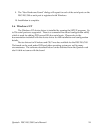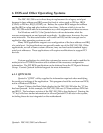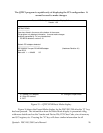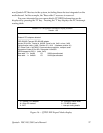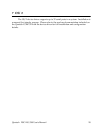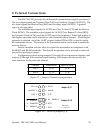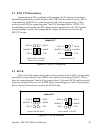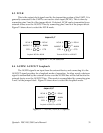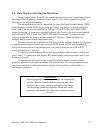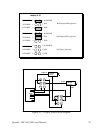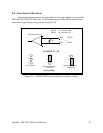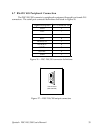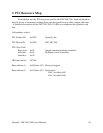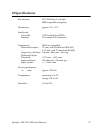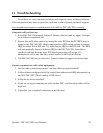
8.5 Half-Duplex/Full-Duplex Selection
Using jumper blocks J6 and J8, the transmitters and receivers of each channel can
be enabled and disabled by modem control signals. This allows operation in both
half-duplex or full-duplex modes.
The transmit drivers can be controlled by either the Data Terminal Ready (DTR)
or the Request to Send (RTS) output from the UART. If a jumper is applied between
pins 1 and 4, the drivers are enabled for TxD and AUXOUT when the UART's DTR
signal is asserted. If a jumper is applied between pins 2 and 5, the drivers are enabled
for TxD and AUXOUT when the UART's RTS signal is asserted. If neither of these
jumpers is applied, the drivers remain enabled at all times. When disabled, the
transmit drivers enter a high-impedance state.
The receivers can be controlled by the inverse of the transmit enable. If a jumper
is applied between pins 3 and 6, the receivers for RxD and AUXIN will be disabled
when the transmit drivers are enabled and vice-versa (based on the DTR or RTS
connections on pins 1-4 or 2-5).
To operate in half-duplex DTR mode, apply jumpers between pins 1 and 4 and
pins 3 and 6. To operate in half-duplex RTS mode, apply jumpers between pins 2 and
5 and pins 3 and 6.
To operate in full-duplex mode, leave the jumpers in their factory default
locations, installed in the spare locations of 4-5 and 6-only. The drivers and receivers
are always enabled in full-duplex mode. Figure 23 shows how to select half- or
full-duplex operation.
WARNING:
When operating in half-duplex mode, the transmitter
drivers must be disabled before receiving any data.
Failure to do so may result in multiple active output
drivers being connected together, which may cause
damage to the board, the computer, and the external
device.
Quatech DSC
-200/300 User
'
s Manual
32



